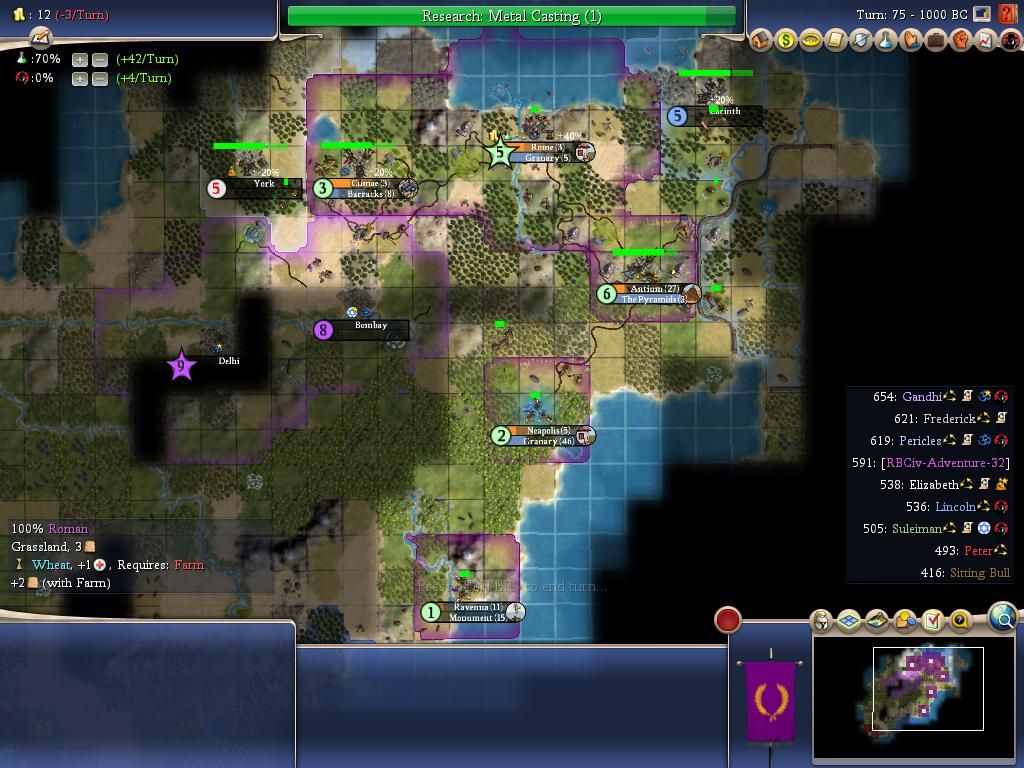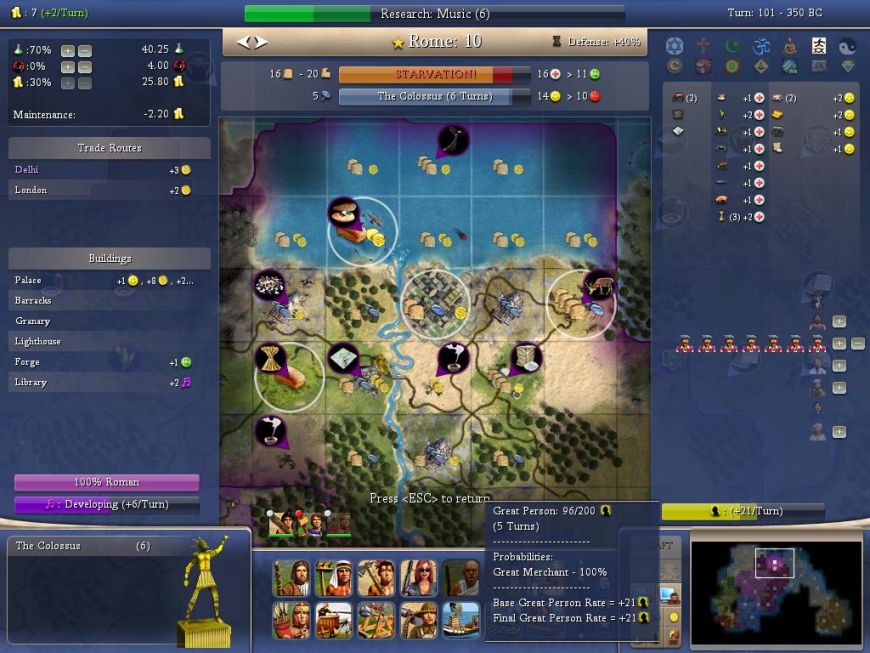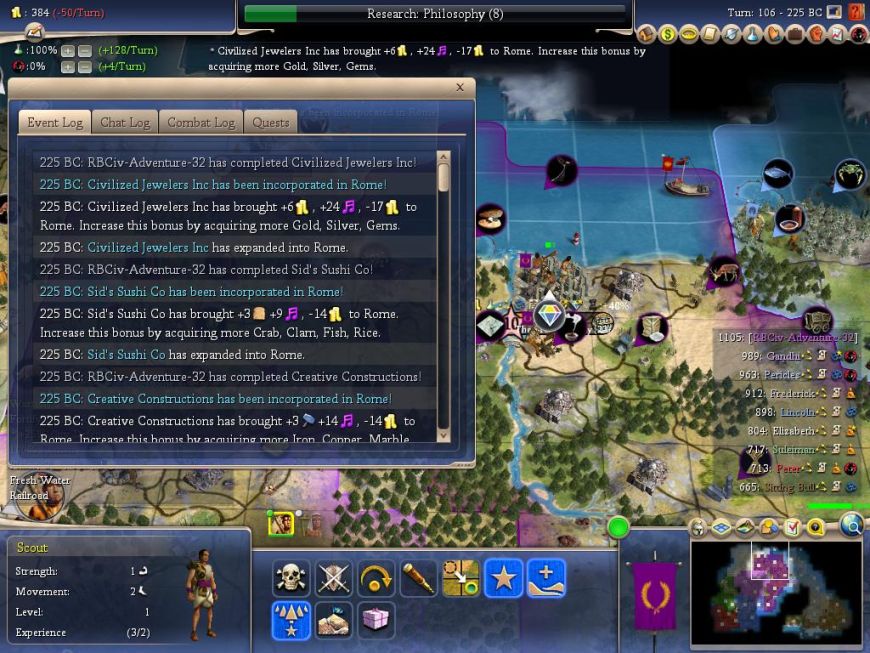

The idea for Adventure 32 came from Deranged Duck, one of our community members. He had a great idea to play around with the corporations from Beyond the Sword, only instead of starting out with one already founded (as in the Something Fishy Epic I sponsored earlier), the player would begin with the required technologies to found six different corporations. However, he or she would need to come up with the requisite Great Person for each, setting up a race with the AIs to see what corporations the player would actually get. Deranged Duck then developed a scoring system based around founding and spreading those corporations. During the setup process, we exchanged a number of emails working out some of the finer details of the game. That sparked my interest in going back and playing this one out, in one of the rare opportunities I had to go through a non-spoiled game.
My goal going in was to try and concentrate on winning by Domination without ever attacking an enemy city. Passive-Aggressive conquest, in other words. I know very well how to go about peaceful domination - I helped write the book on that! And corporations would add an interesting new dimension to that goal, likely multiplying the available culture many times over. I would try to flip as many cities as possible (another scoring goal) while pushing for victory at the earliest date.
There are only three corporations worth bothering with for this kind of gameplan: Sid's Sushi, Creative Construction, and Civilized Jewelers. (I didn't make it a goal to pursue other corporations purely to score more points.) Those three require a Great Merchant, Great Engineer, and Great Artist respectively. The early game was going to be all about landing those three corporations ASAP, hopefully before the first scoring benchmark in 1AD. So let's get started:

Like everyone else, I started with two machine guns and a warrior for this variant. After moving all three units, it became obvious that the settler would be better placed on the coast, to take advantage of the clams tile. I had in mind to put the settler on the plains tile west of the river, so that irrigation would pass naturally through to the wheat tile post-Civil Service, but then my warrior spotted the deer tile three spaces east, and that settled it. Had to have that one. So the capital went on the plains tile one east of the river instead.
Rome turned out to have wheat, deer, clams, gems, marble, incense, sugar, whales, and (later) coal. An embarassment of riches! Even better, some of those resources appeared on tiles that usually do not spawn them, like the grassland wheat and the plains deer. These were obviously resources that Deranged Duck had added to emphasize the corporate nature of this variant. Nothing wrong with that, but the resources on the "wrong" tiles kept drawing my eye, appearing unnatural. (I have had a lot of practice with the Civ4 editor, enough to disguise my edits better.) It quickly became clear that the terrain around the capital was ridiculously lush, to the point where it almost felt like I was playing with Civ3's "Accelerated Production" turned on, for those who remember that. Most of the community-sponsored games have better starting positions than the ones I create. I tend to be miserly that way - two resources is good, three is strong, four is bordering on silly. I almost didn't know what to do with NINE of them!
Rome starts with Fishing tech, bringing up the issue of worker versus work boat at the start. I thought it over for a minute, then decided that I'd be better served to get a work boat out first, growing to a larger size and then using the Expansive boost to worker production. I ran the 3/1 sugar tile for a couple turns, then swapped to the 2/2 deer tile. Work boat finished on turn 13; working the clams and sugar tiles would allow Rome to grow to size 3 in just two more turns, so I ran max food and grew again on turn 15. That finally allowed me to start the worker, using the clams/deer/sugar tiles for 5 food and (4+1) 5 shields per turn. Only six turns to train a worker! Definitely faster than building it right out of the gate.
Meanwhile, my three units were out exploring and popping huts. One of them was nice enough to find Agriculture, saving me from researching it. I thus went right onto Bronze Working after Hunting. I also ran into some angry natives:

Oh no! My machine gunners are under attack by barbarian WARRIORS! 
I quickly found myself surrounded by rival AI civs. Deranged Duck mentioned that it would be a crowded map (8 opponents on a Small pangaea), and that promise was certainly true. Gandhi founded Hinduism right away, which was bad since he was one of my closest neighbors. Passing by his capital revealed that there were four machine gunners and two archers on defense in there - urp! So much for an early rush... Of course, my own machine guns were just as invincible to AI offensive units. The variant pretty much forced the player to act defensively in the early game.
When finished, I had my worker first improve the deer tile, making it a 4/2 tile (essentially a grassland cow). Then he moved to the west side of the capital and improved the wheat, gems, and marble tiles in order. While that was going on, I went right onto settler after finishing the worker. With rivals so close, I *HAD* to get moving on the landgrab. This is one area where the Imperialistic trait actually worked well - a nice element of scenario design. The best spot seemed to be in the southeast, where I planted Antium:

This spot was almost disgustingly blessed with resources. We have cows, wheat, gems, gold, spices, and (once I gain cultural control from Greece) silver and corn. But Antium actually was even better than that, as there turned out to be invisible horses AND iron at the spot too! Craziness.  This location pinned down the Greeks and prevented them from moving further west, while also setting up a longterm pressure location against Athens. I couldn't be happier with the spot. As nice as the western land was, this location had priority.
This location pinned down the Greeks and prevented them from moving further west, while also setting up a longterm pressure location against Athens. I couldn't be happier with the spot. As nice as the western land was, this location had priority.
What's the best way to get settlers built with an Imperialistic civ? Crack the whip and let the overflow go into something else:

Regrowing pop was trivial with a crazy +10 food surplus. What I wanted was those free shields from the whip, and the ability to regrow pop while working on something that wouldn't freeze growth as workers/settlers do. Why the lighthouse? Well, I was planning on having Rome build the Great Lighthouse for free Great Merchant points, to be used to found Sid's Sushi. It wasn't until the lighthouse was complete that I realized the Great Lighthouse cannot be built in this variant, since it's obsoleted by Corporation tech. D'oh! Smoking some fine weed on that one. 
 So much for that strategy. I did have another plan in mind though...
So much for that strategy. I did have another plan in mind though...
I needed a Great Merchant, a Great Artist, and a Great Engineer. How to get them quickly was the key problem posed by this variant. I realized right away that all of the AIs were Philosophical, which would have them popping out the Great People in rapid fashion. The good news is that the early Great People usually tend to be Prophets or Scientists. That also meant that I had to make sure that I didn't produce any of the "unwanted" Great People - so no building Stonehenge or the Oracle, no matter how attractive they might be. I couldn't afford to take the risk of polluting the Great Person pool in my early cities and getting a useless Prophet that couldn't found a corporation.
Merchants and Artists aren't too hard to get, thanks to Caste System civic. (You'd better believe I was going to head there pretty quickly!) Engineers though... that was the bottleneck. There are only two sources of Great Engineer points early in the game: forges and the Pyramids. If I wanted any chance of founding Creative Construction, I therefore *HAD* to land the Pyramids, and do so early enough to make the Engineer points meaningful. I wanted the Pyramids anyway, as Sid's Sushi + food is simply made for running Representation specialists. Even with the wonder, getting the corporation would be dicey, so I was also going to have to research Metal Casting and set up an Engineer specialist in the same city, to get to 5 points/turn. It would still take 20 turns to pop a Great Person at that rate, so the Great Engineer was going to have to come first, then either the Merchant or Artist. Got all that?
50 turns into the game, you can already see my plan going into effect:

Antium started building the Pyramids as soon as I researched Masonry. Why not? No military units could be built other than insanely expensive machine guns, and I still lacked Pottery for a granary. Early bird gets the worm, and the Pyramids were simply too important to delay for no reason. Cumae became city #3, butting up against both an Indian city (Bombay, to the south) and English one (York, to the west). Already I was running out of space! I hoped to gain control of the stone resource south of Cumae, but Gandhi would finish a monument in Bombay first, and then his religion spread there, putting him ahead of the cultural curve. It would be a very long time before I would claim that territory as my own.
All expansion to the east and west was already blocked by this point. I did see an opportunity to the direct south, so that was where the fourth settler headed, once again whipped out of Rome:

Neapolis wasn't quite as strong as my initial cities, but still an excellent location. It also importantly gave me a seaport on the southern coast of the pangaea, which would become big later on. I would have preferred the spot on the northeast coast, where there was another cluster of resources, but Pericles put Corinth there first. The only good news there was that it was close enough to my core cities to be certain of flipping later on. Similarly, I would leave the coast directly south of Antium unsettled. The Greeks were sure to plop a low-quality city there, and then I could flip it later on for scoring points. My own settlers would have to go further afield, getting toeholds in other disputed regions.
Note the Metal Casting research and Pyramids build moving steadily along towards completion. Like I said, you've got to have a plan and get started on it early! I'm looking forward to seeing how the others in the community play this out. By the time 1000BC rolled along, both were almost done:

I had no idea how close the other civs were on the Pyramids, so I wasn't taking any chances. Some of them had stone on hand and were assuredly racing me to the wonder. In terms of the landgrab, I reached out and grabbed my final core city of Ravenna in the far south. The Americans had been twiddling their thumbs down there, so I poached a spot out from under their noses. Ha! There was good land down there too. As much as I wanted to add more cities in the western jungles, I couldn't afford to do so economically. Corporations are very expensive in the early game, meaning I had to err on the side of caution here. If I couldn't research up to Code of Laws/Caste System civic in timely fashion, this was all going to be for naught.
So the Pyramids did complete as expected in 925BC (skipping screenshot to save space - we've all seen it before). I then traded Metal Casting around for all the techs I had missed during my beeline, in classic Civ3 fashion:

The AI is still a little too easy to manipulate in this way... Future Civ games might be better served by adopting a more restrictive trade system in terms of tech. We made some progress here over Civ3, just not enough in my opinion. Anyway, these trades cleared my way through the monk branch of the tree to Code of Laws, which the AI as usual wasn't emphasizing nearly enough. And with Metal Casting in hand, I could immediately whip a forge in Antium and run an Engineer specialist:

This actually made the city happier, thanks to gems and gold on hand. Love that Civ4 logic. I've always been a big fan of getting forges into play early for Industrious civs too. Did that in Epic One, if I remember correctly. I now had a Great Engineer coming in 18 turns, which would be turn 100. The first scoring deadline (1AD) would arrive on turn #115. I felt pretty safe to get Creative Construction now - the AI would have to build a forge and run an Engineer specialist to beat me - leaving only the other two corporations in doubt. I was going to have exactly fifteen turns to try and get the Merchant and Artist...
Eleven turns passed, and I completed research on Code of Laws (just in time, as I was literally out of money). I was the first one there, so Confucianism was founded in Neapolis. That would give me another religion to spread around for cultural purposes, excellent. I now took a turn to revolt to Caste System - and Representation, getting a 2 for 1 in the process. Here's the new strategy:

Hire tons of merchant specialists! Oh how I love Caste System. It's too bad that Slavery is even better for most situations; I've always admired the elegance and flexibility of play that Caste System opens up. I timed the Great Person points so that Antium would fire first and produce a Great Engineer on turn 101 (350BC). Then Rome - sitting on 96 Great Person points - could crank up the Merchants and go hog wild, as seen above. Of course, that would still leave me short a Great Artist, and there was no way to produce one naturally before the AD years. Fortunately, Music and the free Great Artist were only six turns away!
I love it when a plan comes together. 
Great Engineer born on turn 101, Great Merchant and Great Artist together on turn 106. Did it with nine whole turns to spare! Piece of cake. Let's get these corporations founded:

Look at all that yummy culture! 47/turn to start, and that will grow much larger as I acquire more resources. Of course, it all comes with a cost:

Yeouch! Uhh, that courthouse might be a good idea! Good thing that I had plenty of money on hand from selling outdated techs to the backwards AI civs. Nothing else major happened in the final nine turns; the only thing I did was spread Civ Jewelers to Antium for a few extra scoring points right before the deadline. Here then is my score from 1AD:
3 corporate HQs = 300 points
4 branches = 40 points
Total = 340 points
This should be pretty solid in terms of the competition. Four corporations should be the absolute maximum anyone can found by 1AD - at least, I hope so! Even that would be impressive, IMO. I'm sure you can do more with moving the corporate branches around though. We'll see what everyone comes up with.



